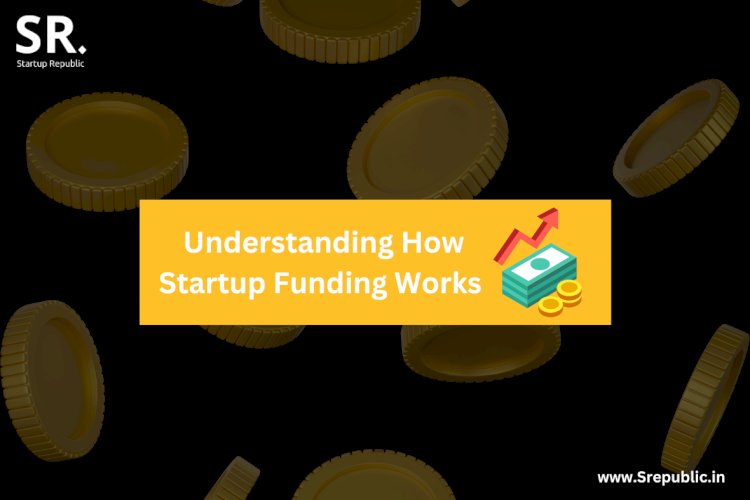Navigating the Funding Maze: Understanding How Startup Funding Works

Introduction: Starting a business is an exhilarating journey, but turning your innovative idea into a reality often requires financial support. This is where startup funding comes into play. In this blog, we'll take you on a journey to demystify the world of startup funding, exploring its various stages, sources, and the factors that investors consider. Whether you're a budding entrepreneur or simply curious about the intricacies of funding, this guide will equip you with valuable insights.
- The Stages of Startup Funding: Startup funding typically occurs in different stages, each with its own characteristics and purposes. Let's explore the most common stages:
a. Seed Stage: During the seed stage, entrepreneurs seek capital to transform their ideas into viable businesses. Seed funding can come from various sources, such as personal savings, friends and family, angel investors, or crowdfunding platforms. The investment amounts are usually smaller, and the focus is on validating the concept and developing a minimum viable product (MVP).
b. Early Stage: At the early stage, startups have established a market presence, achieved some level of traction, and require additional funding for scaling operations. Venture capital (VC) firms and angel investors often participate in this stage, providing funding in exchange for equity. Investors evaluate factors such as market potential, team expertise, and growth projections before making investment decisions.
c. Growth Stage: In the growth stage, startups have proven their business model and are experiencing rapid expansion. Funding at this stage aims to accelerate growth, enter new markets, or develop new products. Venture capitalists, private equity firms, and corporate investors become prominent funding sources. They analyze financial performance, market share, competitive advantage, and scalability to determine investment opportunities.
d. Later Stage: At the later stage, startups have achieved significant scale and are preparing for an initial public offering (IPO) or acquisition. Funding at this stage may involve larger VC firms, private equity, or strategic investors. Due diligence becomes more rigorous, focusing on financial metrics, market dominance, intellectual property, and exit potential.
- Sources of Startup Funding: Startups have various sources of funding available to them, depending on their stage of development and specific requirements. Let's explore some of the primary sources:
a. Bootstrapping: Bootstrapping involves funding your startup using personal savings or revenue generated from the business. It provides complete control over decision-making but may limit the scale and pace of growth.
b. Friends and Family: Entrepreneurs often seek financial support from their friends and family network in the early stages. These investments are typically based on personal relationships and trust, but it's essential to handle such arrangements professionally and transparently.
c. Angel Investors: Angel investors are high-net-worth individuals who provide capital in exchange for equity. They often bring valuable expertise, mentorship, and industry connections along with their investment.
d. Venture Capital: Venture capital firms pool money from investors to invest in high-potential startups in exchange for equity. They typically focus on companies with high-growth potential, often investing at the early and growth stages.
e. Crowdfunding: Crowdfunding platforms allow entrepreneurs to raise capital from a large number of individuals who contribute smaller amounts. This approach can help validate the market demand and build a community around the product or service.
f. Government Grants and Programs: In some regions, governments offer grants, subsidies, or tax incentives to support entrepreneurship and innovation. Research local programs and initiatives that can provide funding opportunities for your startup.
- Factors Considered by Investors: Investors evaluate multiple factors before deciding to fund a startup. While the specific criteria may vary, here are some key aspects that commonly influence investment decisions:
a. Market Potential: Investors assess the market size, growth rate, and competitive landscape. They seek startups targeting large markets with significant growth opportunities.
b. Team and Expertise: The startup team's skills, experience, and track record play a crucial role. Investors look for talented founders with domain expertise and a strong execution strategy.
c. Unique Value Proposition: Startups must have a compelling value proposition that solves a real problem for their target market. Investors assess the product or service's uniqueness and its potential for disruption.
d. Traction and Milestones: Evidence of market traction, user adoption, revenue growth, and achieved milestones strengthens a startup's investment case. It showcases the ability to execute and validates the market demand.
e. Financial Projections: Investors evaluate the startup's financial projections, including revenue forecasts, profitability models, and return on investment potential. Clear and realistic financial plans are vital.
f. Scalability and Exit Potential: Investors seek startups with scalable business models capable of generating substantial returns. They also consider the potential exit strategies, such as IPOs or acquisitions, to ensure a viable path for a return on their investment.
Conclusion: Startup funding is a complex landscape with multiple stages, sources, and considerations. By understanding the various funding stages, exploring available sources, and recognizing what investors seek, you can navigate the funding journey with confidence. Remember, funding is not only about securing capital but also about finding partners who believe in your vision and can contribute to your success. With determination, a solid business plan, and the right funding strategy, you can turn your startup dreams into a thriving reality.

 Lalita Singh
Lalita Singh 






















